'No different from other teachers': The childcare aide with special needs
When one voluntary welfare organisation decided to tap on people with special needs to work in their childcare centres, questions arose: Would this create more work for teachers? Would the children accept her? Would parents give her a chance?
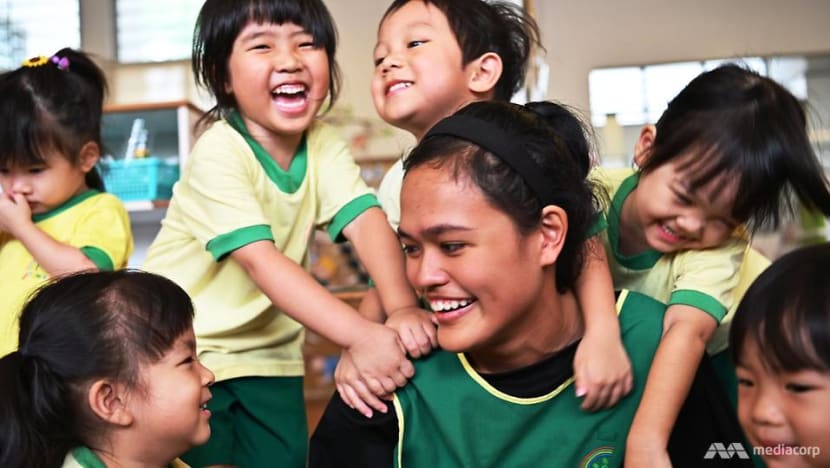
18-year-old Ayuni is a childcare aide at a Presbyterian Community Services childcare centre.
SINGAPORE: Growing up, 18-year-old Nur Ayuni Abdul Rahim had always kept to herself.
In primary school, her older brother often came home with tales of how she had been bullied by other students. But she had never said a word to her family.
“It’s quite hard to understand what she’s feeling or thinking, and she’s not the type of person to express herself,” said her oldest sister, Nur Azian.
The bullying broke her family's hearts. And their hearts took another beating when Ayuni’s primary school approached them when she was 11, suggesting that Ayuni transfer to Grace Orchard School, a special education school for students with mild autism and mild intellectual disability.
“We thought she was normal, but just needed to work hard," said Azian.
Ayuni’s family had always known she was a slow learner, but it turned out that Ayuni had mild intellectual disability, a developmental disorder that makes it harder for her to grasp concepts and solve problems.
They also grew used to her silence.
After all, she was part of a large family, with 10 other siblings and even nieces and nephews living in the same house. Their flat in the western part of Singapore - home to 16 people - was often a boisterous place.
After Ayuni began to attend Grace Orchard School, the family noticed a change in her - she started coming home looking happier.
And one day, as Ayuni was helping to shower her niece Farisha, Azian heard the unmistakable strains of a familiar nursery rhyme echoing through the bathroom door. Ayuni had started to be trained as a childcare aide and was singing the nursery rhymes she had learnt to Farisha - something Azian had never heard her do before.
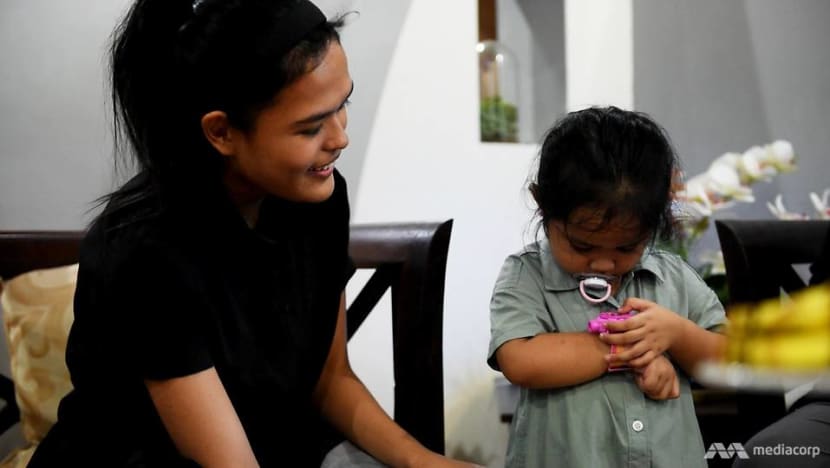
Azian had never imagined something as simple as a nursery rhyme could make her so emotional, because hearing Ayuni sing out loud - naturally, and without prompting - was a testament to how far she had come: From a quiet, reserved girl, to one who can handle children with confidence, and harbours hopes of becoming a childcare teacher one day.
PRICELESS OPPORTUNITY
The seeds for Ayuni's journey to becoming a childcare aide were first sown in 2014 when Grace Orchard School wanted its students to gain some work experience in a childcare setting.
At the time, the school provided four training tracks for its students - horticulture, retail, hospitality and F&B - and they were keen on exposing students to more areas of work.
“Not all of them are suitable, and not all of them are interested in these four tracks,” said Lisa Goh, Grace Orchard’s principal.
Imagine having to work your whole life in something you’re not interested in at all. That’s why we felt that we needed to give our students more career choices.
The school, which operates under the umbrella of voluntary welfare organisation Presbyterian Community Services (PCS), reached out to PCS.
As a trial, some Grace Orchard students began visiting PCS childcare centres a few hours a week.
And in 2017, to take the programme further, a pilot scheme was launched to formally train a pioneer batch of three students as childcare teacher aides. Their role would be to help teachers with routine tasks such as feeding and showering the children, and give additional support to the teachers during lesson time.
The structure of the curriculum that includes a mix of classroom training and hands-on experience at a PCS childcare centre in Jurong was jointly developed by PCS and the school.
Before they graduate from the programme, the three selected students - Ayuni and two other girls her age - would also be sent out as interns to different PCS centres.
Throughout the process, a job coach from Grace Orchard as well as a PCS trainer would work with the students, visiting them at the centres to observe and guide them.
During each of her visits, PCS trainer Gomathey Veeramari, who prefers to be known as Gomy, has one-on-one reflection sessions with each of the students to give her feedback on what was done well, and the areas that need improvement.
“It’s very important to do regular monitoring of the students, to check on their overall performance and to discuss with the principals and teachers how their performance can be improved further,” she said.
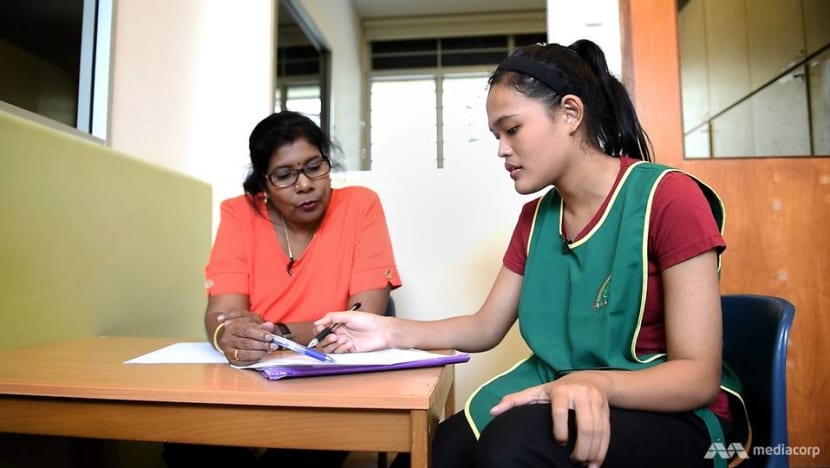
It would take three years for the girls to complete the programme, which Lisa said was necessary as every task required of the students was broken down to help them understand better.
For example, instead of simply telling the student to feed a child, the student would be guided to first take the food out, scoop a certain amount onto the plate, check the temperature of the food, spoon it into the child’s mouth and wait for the child to swallow before repeating the process.
“They need that length of time and very specific instructions,” she explained.
But three years to train only three students?
Lisa stressed that they were more than happy to invest the time and effort in the students.
To see the life of a child change… I think it’s just priceless. You can’t put a price tag on it.
“If I can train these girls to be independent and contributing members of society… I think it’s something worth doing, regardless of how long the time is.”
ALREADY WELL-TRAINED
When the school first broached the idea of the programme to Ayuni’s family, Azian remembers being happy to give it a try. At the time, Ayuni had been working in her school's training cafe and was planning to join the F&B track.
But her sisters had reservations about it.
“I used to be in the F&B line, and I know what it’s like,” said Azian. “If a customer were to complain or approach her directly in a rude manner… she’s not the type of person who would talk back and she’d just keep quiet.”
“Also because we have a lot of siblings… our mum trained us to take care of each other,” added Ayuni’s fifth sister, Nur Amirah. “So she already knew how to do things like changing diapers and showering the children.”
Amirah added that although Ayuni had initially wanted to stick with F&B so that she could continue schooling with her friends, she was happy that Ayuni eventually made the decision to try out the new opportunity.
“It was something new, and not everyone got the chance to be in childcare,” she said. “I thought she was lucky to get in.”
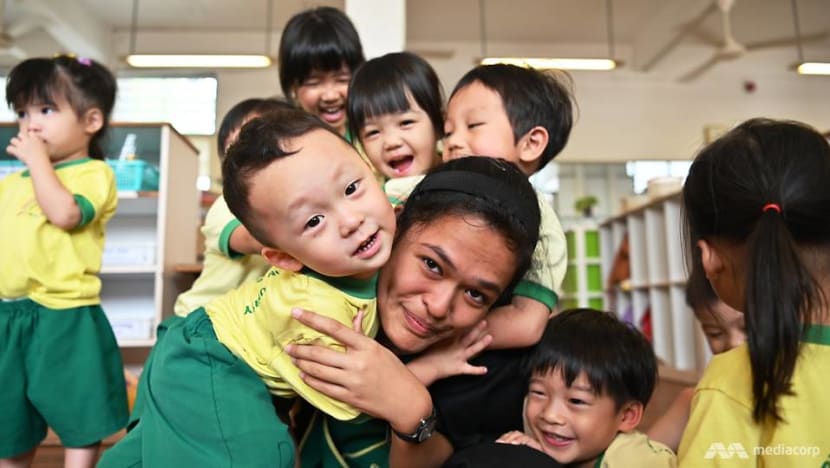
DETERMINED TO MAKE IT A SUCCESS
When PCS centre principal Kelyn Soh received word from her manager in February that came April, a new intern named Ayuni would be joining her centre as a childcare aide, her first instinct was excitement.
“Even before they told me about this programme, I had already thought to myself: What if one day the early childhood sector could employ people with special needs?” she said.
“I was determined to make it a success.”
She had always believed that people with special needs should be given opportunities in life. Besides, she knew there were many benefits.
For one, these aides - who would have already gone through two years of structured, detailed training - would come in already knowing what they needed to do, and how to do it.
In comparison, no formal training is required for one to become a programme helper who would typically take on a similar role in the centre as these aides.
But Kelyn also knew there would be challenges.
“My concern as a principal would be my team, because I need them to support this programme as much as I do and to buy into the idea,” she said.
My second concern would be the parents. I didn’t know if they would be receptive to it.
Some of her teachers, she said, shared her concern about the parents. But she knew that was something she would have to take as it comes.
At the same time, the teachers also wondered whether the aide would slow down their work process, or have trouble understanding their instructions.
“When we react to children, at times we need to be very fast,” she explained. “So the teachers were concerned that it would be an added load for them having to take care of the children while taking care of the aide as well.”
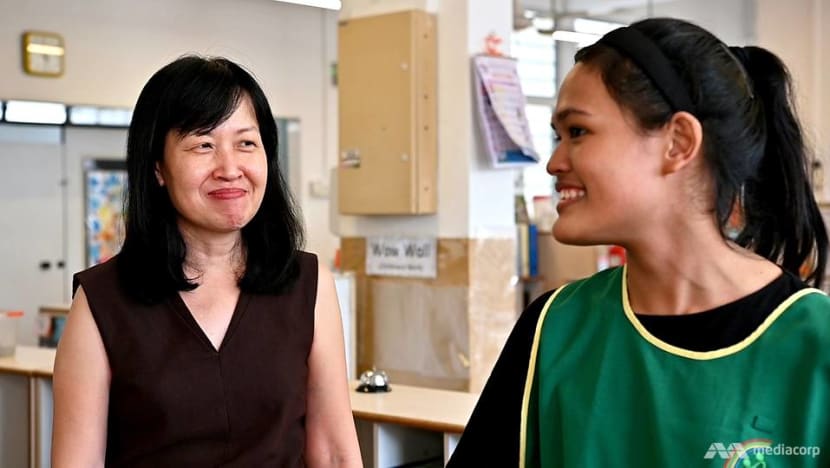
She worked with Grace Orchard School to help address these concerns.
Prior to Ayuni’s arrival, Gomy also came down to conduct a workshop for the teachers to help them understand how they could make her feel welcome.
In addition, Kelyn interviewed each teacher personally to make sure that Ayuni was placed in a class where the teachers would be more receptive to her.
We just wanted her to feel loved and accepted.
WATCH: A special kind of teacher (Dur 7:31)
A GIRL OF VERY FEW WORDS
Ayuni remembers being nervous on her first day at the centre.
Having gone through two years of training, alternating between lessons in the classroom and taking care of children at another PCS centre, she knew what she was expected to do. But being in a new environment made her uncomfortable.
“When I first came, the children didn’t want to talk to me,” she said. “They would move away and look at me from afar.”
“Inside, I felt scared.”
When she was nervous, she preferred to do her tasks in silence, and she had to be reminded to speak more to the children.
“She was a girl of very few words,” said Jean Ngoo, the teacher Ayuni was assisting. “The first day, whenever I spoke to her, she would just say, 'Okay, okay, okay.'”
Jean remembers being concerned that she would have to spend extra time guiding her. But as the days went by, it got easier and easier to guide Ayuni.
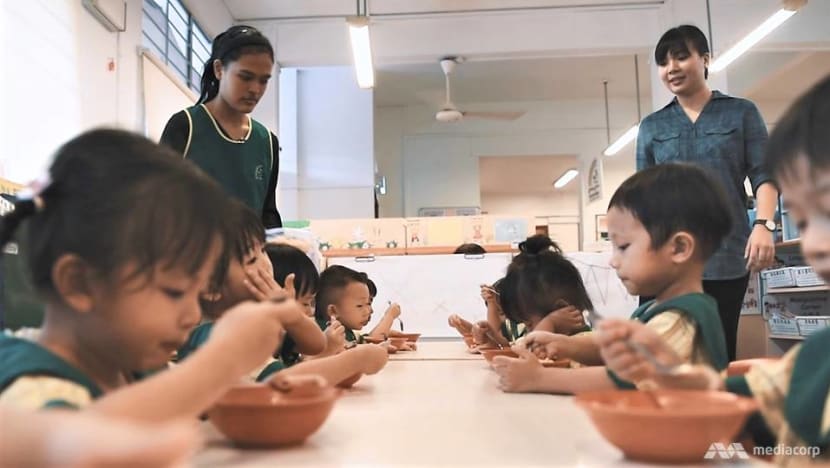
“When I tell her something, she remembers it very clearly. And when I teach her something new, she’s very willing to learn, and can take feedback well,” she said.
“As she got more comfortable with us, she started speaking a lot more and she doesn’t need reminders anymore.”
Being more communicative was also something that was emphasised during Ayuni's weekly reflection sessions with Gomy.
“I would tell her how to start conversations with the children,” Gomy said. “Let’s say during lunch time, I would tell her she can say things like, 'Do you like what you are eating? Can you tell me what is in your food?'"
Kelyn, being new to this childcare centre herself, empathised with Ayuni and made it a point to keep an eye out for her.
“She was scared at first, and she was worried that she couldn’t remember all the children’s names,” she said.
“It was like that for me when I first came to work. So many classes, so many teachers. It was so challenging so of course she would feel the same way.
“It’s normal.”
“When I did my rounds around the centre, I made an effort to intentionally look at her, make eye contact with her and smile,” she added.
“Soon, I realised that whenever I smiled at her and caught her attention, she would smile very brightly."
THE CHILDREN LOVE HER
Today, Ayuni is in the final months of the programme before she graduates. To the children, she is Teacher Ayuni, no different from Teacher Jean and the other teachers in the centre except for her long ponytail and the green apron she wears that identifies her as a teacher aide.
She loves to sing songs to the children, and does the accompanying hand actions with gusto.
She knows the quirks and fancies of each child in her class, and can rattle off all their names on request.
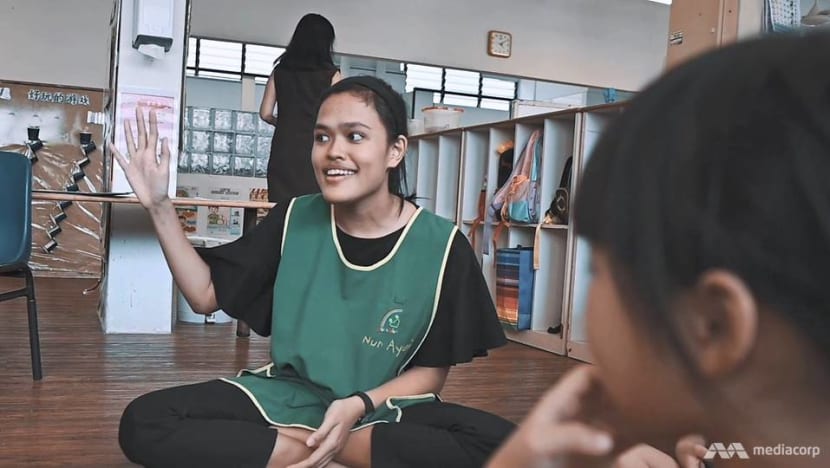
When CNA Insider visited the childcare centre, a boy’s head turned the moment he heard her saying his name, and he ran towards her.
“Psssst!” He pointed at her with his finger, grinning.
“Psssst!” Ayuni mimicked the sound and action. When she smiles, it lights up her whole face.
“This one is my favourite,” she said, as the boy clambered onto her lap, giggling, and reached out to touch her face.
Ayuni has blossomed during her internship here and has even exceeded expectations by starting to read to the children, a task that was not initially in her job scope.
“The children love her so much that sometimes they run to her instead of to me and my Chinese teacher,” Jean said, laughing.
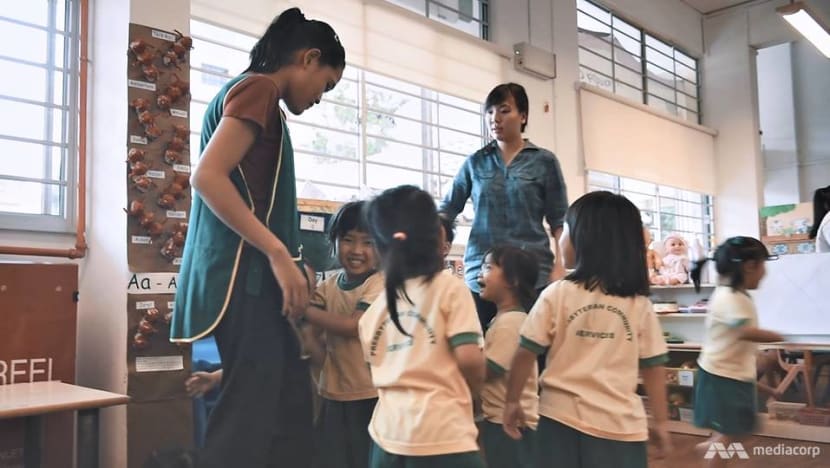
Ayuni’s relationships with her colleagues have also blossomed, but a special place in her heart is reserved for her principal. Every morning when she reports for work, she makes it a point to knock on Kelyn’s office door and greet her.
“If I don’t greet her, I feel like something is wrong,” she said.
“I like Ms Kelyn because every time she sees me in class, she keeps smiling,” she added. “So I smile back at her”.
Whenever Kelyn has to miss a day of school, Ayuni would, without fail, text her to tell her that she misses her.
“She would always ask me how I am, if I have eaten, and remind me to take care of myself,” Kelyn said.
She has such a beautiful heart… as beautiful as how she looks.
“She grew to be so close to the children, they love her and she loves them. I feel that she is no different from any other teacher,” she added.
“Nobody can tell that she has special needs.”
WOULD OTHERS GIVE HER A CHANCE?
When Ayuni and the other girls from the pioneer batch graduate, they will be guaranteed employment in PCS centres. PCS has also agreed to guarantee the graduates from the subsequent batch employment in their centres.
But beyond this, PCS hopes that other preschools would be willing to take them on, according to PCS executive director David Lim.
“We want to make them our ambassadors… to show other employers that they can do it,” he said.
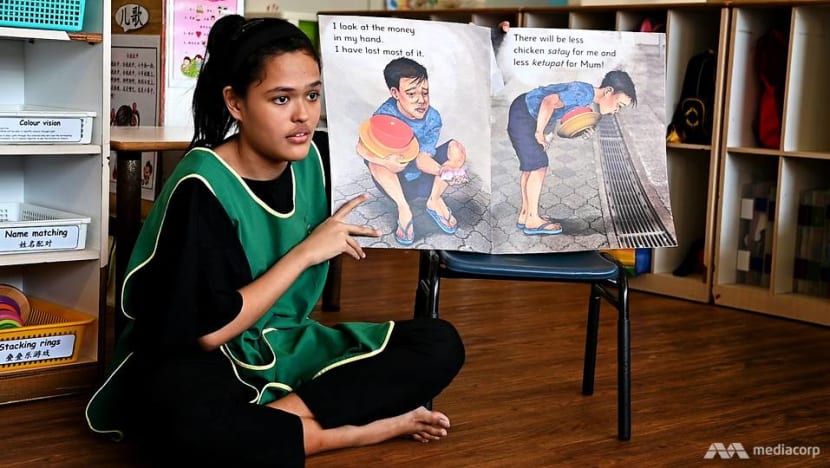
Currently, PCS is in talks with a preschool anchor operator to open up their centres to the students who graduate from this programme. They also hope to expand the programme and are planning to convert part of one of its centres to become a place for the students to undergo classroom training.
But David acknowledged that getting other preschools to give the likes of Ayuni a chance can be a challenge.
“Some preschools are sure to have some apprehension, especially those who have not worked with people with special needs before,” he said. “Some people have this misconception that people with special needs are those who are very severe… But these students have higher ability.
"We have seen that they are more than capable to serve in the childcare setting.”
In anticipation of parents’ concerns, the PCS centre in Jurong that was used for training the three girls invited parents down to meet the students. They were pleasantly surprised by the parents’ reaction.
“When they met the girls and got to see who they were, they were actually very positive about it,” said David. “We assumed it would be our greatest challenge, but it turned out differently.”
Back in Ayuni’s centre, Kelyn knew that it was only natural for parents to be worried about their children’s safety and well-being.
“From a mother’s perspective, it’s understandable. I want my children to be in good hands. So the preschool would need to assure parents that the childcare aides are well-trained and are able to take care of the children safely,” she said.
So far, parents whom she has spoken to about Ayuni were receptive and welcoming. She is also glad that Ayuni’s presence gave her the opportunity to spark conversations with parents about people with special needs.
“Some had this misconception that people with special needs have a different look, so they were surprised that she didn’t look different. That’s about it,” she said. “It is a good opportunity to raise awareness that there are some who are able to function normally and contribute to society.”
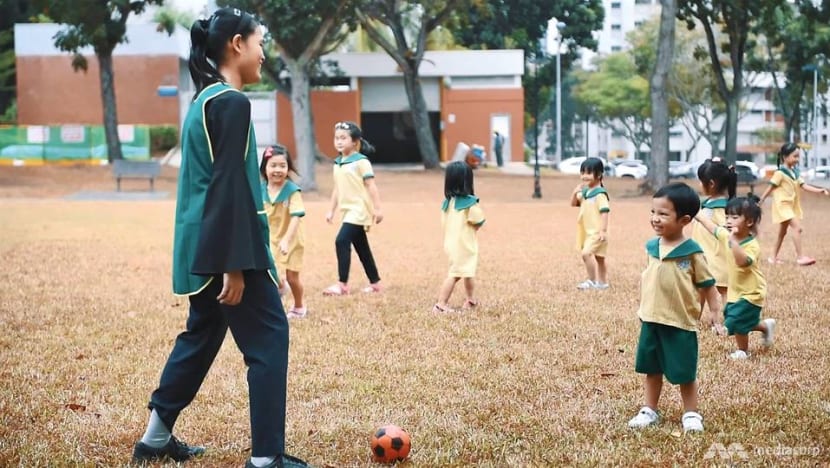
Kelyn also hopes that Ayuni’s presence would give rise to conversations between parents and their children about those who may be different - something which is already beginning to happen.
“My son is starting to stereotype people… perhaps those with abnormalities in their facial features, or people with no hair. So I tell him not to label and to just accept that they are different, but no less equal,” said mother of two, Cheryl Lim, whose younger son is in Ayuni’s class.
“I wouldn’t want to let him know that Teacher Ayuni is someone with special needs, but rather she is someone who is there to help him in his daily life and his learning,” she added.
BEYOND EXPECTATION
After months of seeing Ayuni come home from work smiling, and hearing the sound of nursery rhymes echoing through the house as Ayuni sang to her niece, Amirah decided to go down to the centre to visit Ayuni for the first time.
She had a day off from work, and wanted to see her sister’s transformation with her own eyes.
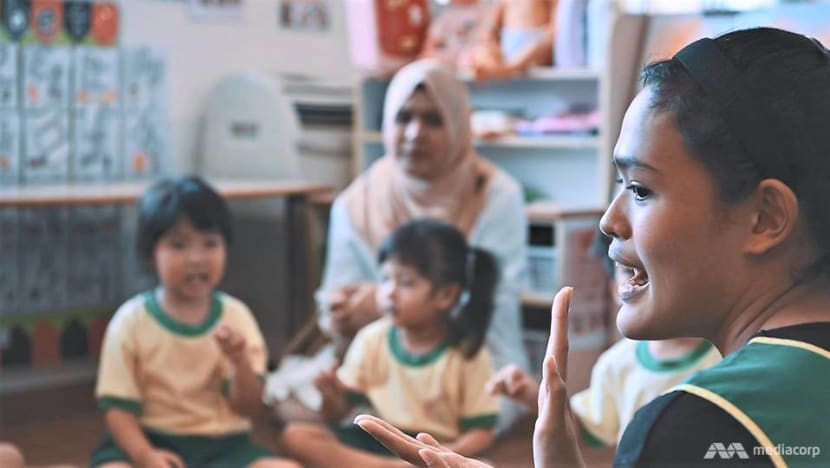
As she approached the centre, the general hubbub of children’s voices grew louder. It was a busy time. The children had just woken up from a nap, and the teachers were getting ready to feed them a snack.
In the thick of the action was Ayuni. After serving cakes, she sat down next to a boy to help him eat his snack. She was smiling at something the boy was saying, and laughed when he made a face at her.
As Amirah peered into the window to watch Ayuni at work, tears sprang to her eyes.
“We only know the stories of what she does at work, but this is beyond what I’ve expected,” she said. “I wasn’t sure if she would take care of other children well… but she’s doing great.”
The tears flowed again when Ayuni came out to meet her.
“I’m so, so proud of you,” she said, dabbing at her eyes. “You’re doing very well. Keep it up.”
Ayuni laughed shyly. “I want to cry too,” she said.
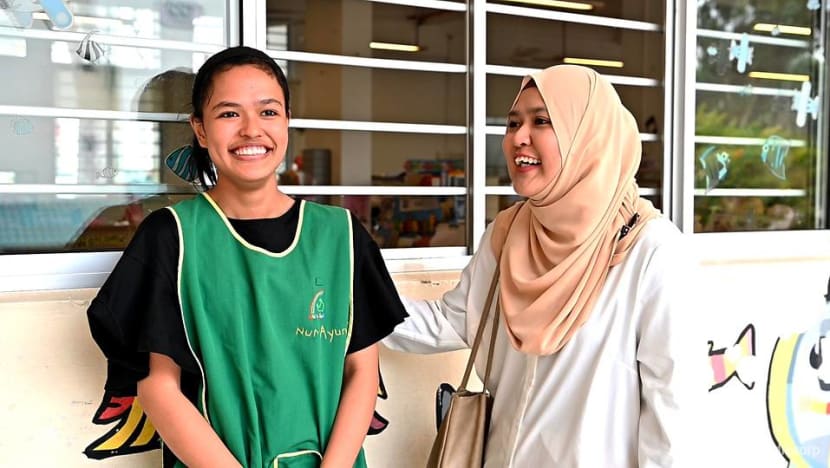
She is sure that she wants to continue in the early childhood sector. And she says she has hopes of one day becoming a fully-fledged childcare teacher.
Her sisters know of her dream, but they also know there are challenges. There will be courses and diplomas she needs to complete in order to be certified. They do not know if she is able to complete them.
But given how much they have seen Ayuni progress, and how far she has come, they hope that one day, she will succeed.

















